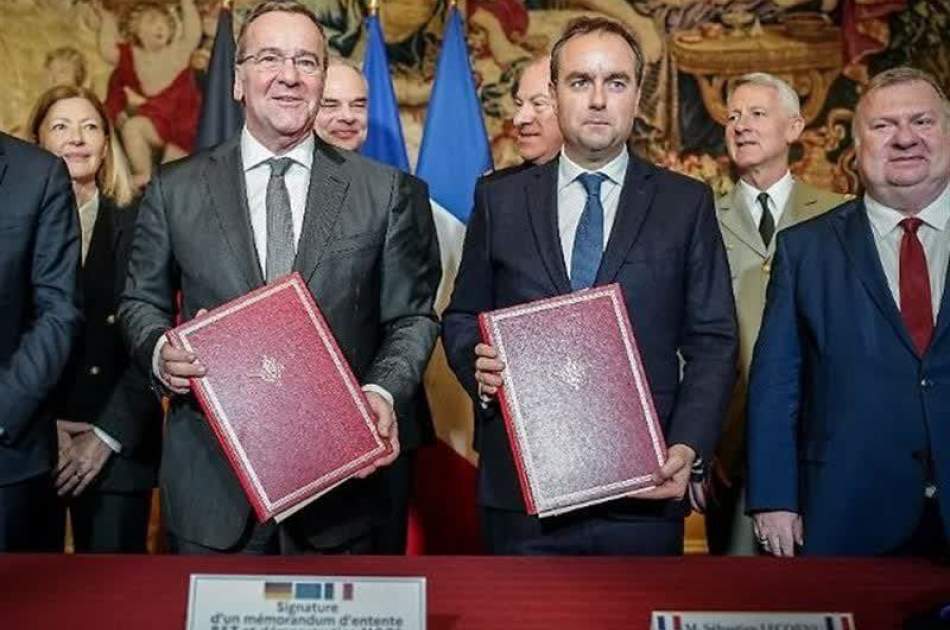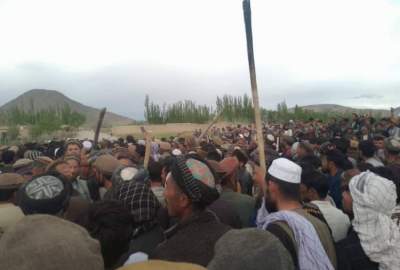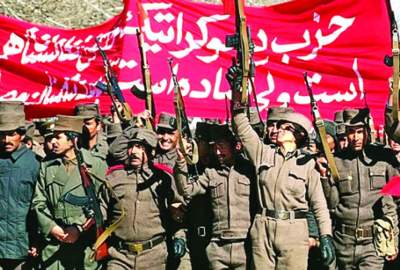The defense ministers of Germany and France signed an agreement to jointly build an advanced ground combat system that plans to build modern and ultra-advanced tanks for future battles.
Publish dateSaturday 27 April 2024 - 15:11
Story Code : 289473
Afghan Voice Agency (AVA) - International Service: According to the newspaper "Wirtschaftswuchhe", Germany and France reached a basic agreement on the joint construction of an advanced ground combat system. German Defense Minister Boris Pistorius and French Defense Minister Sébastien LeCorneau signed a memorandum of understanding in Paris to build the next super-modern main battle tank.
According to reports, it has also been agreed on the distribution of the tasks of this large project worth billions in eight pillars, with Germany and France leading in two pillars each. Arrangements should be made regarding the division of duties in the other four pillars.
Known as the Main Ground Combat System (MGCS), the weapon system is the counterpart of the French-led Future Air Combat System (FCAS). In the future, this system will connect battle tanks in a data network with supporting weapons such as drones and other unmanned systems, thus enabling a leap in military technology. This system follows on from the Leopard and Leclerc main battle tanks.
Thus, instead of further developing the Leopard II or Leclerc tanks at the national level, Germany and France are now focusing on the large project "Main Ground Combat System" - a large project worth billions of dollars that aims to transform the world of tanks. transform
Thus, by jointly developing an advanced ground combat system, Germany and France want to prepare for military threats in the coming decades. German Defense Minister Boris Pistorius and his French counterpart Sebastien LeCorneau signed an agreement ("memorandum of understanding") in Paris that also set out the long-disputed distribution of duties.
"We want to build the ground combat system of the future with MGCS," Pistorius said at a press conference with his French counterpart. He added: "Here, the issue is not the further development of Leopard and Leclerc main battle tanks, but a completely new issue."
While France is at the helm of the joint air combat system FCAS, Germany is to control the ground combat system. "We are making progress," Pistorius said.
At the same time, the industries of both countries should participate in this project almost equally. Pistorius said: "We agree that there should and should be a 50% mutual value creation in the industry so that this too can clearly be a model of equality."
Lecorno also said: "The issue of the future tank is not discussed here, but the issue is about the future of tank systems." He emphasized France's friendship with Germany and stated that free discussions have taken place in this regard.
Other European countries should also be attracted to participate in this project. Pistorius mentioned Italy and Poland among others.
Of course, to advance this project, many technologies still need further development. Lessons from the course of the war in Ukraine and assumptions about the capabilities of potential adversaries should be included. The fact that weapons systems must also operate unmanned could be part of the answer to troop shortages in Western societies and demographic changes. Previous experiences show that delays and cost increases are the risks of this project.
A project company task force is planned for the MGCS program, consisting of the companies KNDS Deutschland (formerly KMW), KNDS France, Rheinmetall Landsysteme and Thales SIX. Under the joint leadership of Germany and France, it is supposed to cover four parts, the overall MGCS system platform - the gun platform, the missile platform, the combat support platform and the operational system.
NATO Secretary General Jens Stoltenberg praised the agreement in principle between France and Germany to jointly build an advanced ground combat system. Stoltenberg said: This is good news.
Stoltenberg said: "We welcome the cooperation of NATO allies to build military capacity because it makes us stronger." We are generally in favor of the cooperation of allies. This will help us overcome the fragmentation of our defense industry."
According to reports, it has also been agreed on the distribution of the tasks of this large project worth billions in eight pillars, with Germany and France leading in two pillars each. Arrangements should be made regarding the division of duties in the other four pillars.
Known as the Main Ground Combat System (MGCS), the weapon system is the counterpart of the French-led Future Air Combat System (FCAS). In the future, this system will connect battle tanks in a data network with supporting weapons such as drones and other unmanned systems, thus enabling a leap in military technology. This system follows on from the Leopard and Leclerc main battle tanks.
Thus, instead of further developing the Leopard II or Leclerc tanks at the national level, Germany and France are now focusing on the large project "Main Ground Combat System" - a large project worth billions of dollars that aims to transform the world of tanks. transform
Thus, by jointly developing an advanced ground combat system, Germany and France want to prepare for military threats in the coming decades. German Defense Minister Boris Pistorius and his French counterpart Sebastien LeCorneau signed an agreement ("memorandum of understanding") in Paris that also set out the long-disputed distribution of duties.
"We want to build the ground combat system of the future with MGCS," Pistorius said at a press conference with his French counterpart. He added: "Here, the issue is not the further development of Leopard and Leclerc main battle tanks, but a completely new issue."
While France is at the helm of the joint air combat system FCAS, Germany is to control the ground combat system. "We are making progress," Pistorius said.
At the same time, the industries of both countries should participate in this project almost equally. Pistorius said: "We agree that there should and should be a 50% mutual value creation in the industry so that this too can clearly be a model of equality."
Lecorno also said: "The issue of the future tank is not discussed here, but the issue is about the future of tank systems." He emphasized France's friendship with Germany and stated that free discussions have taken place in this regard.
Other European countries should also be attracted to participate in this project. Pistorius mentioned Italy and Poland among others.
Of course, to advance this project, many technologies still need further development. Lessons from the course of the war in Ukraine and assumptions about the capabilities of potential adversaries should be included. The fact that weapons systems must also operate unmanned could be part of the answer to troop shortages in Western societies and demographic changes. Previous experiences show that delays and cost increases are the risks of this project.
A project company task force is planned for the MGCS program, consisting of the companies KNDS Deutschland (formerly KMW), KNDS France, Rheinmetall Landsysteme and Thales SIX. Under the joint leadership of Germany and France, it is supposed to cover four parts, the overall MGCS system platform - the gun platform, the missile platform, the combat support platform and the operational system.
NATO Secretary General Jens Stoltenberg praised the agreement in principle between France and Germany to jointly build an advanced ground combat system. Stoltenberg said: This is good news.
Stoltenberg said: "We welcome the cooperation of NATO allies to build military capacity because it makes us stronger." We are generally in favor of the cooperation of allies. This will help us overcome the fragmentation of our defense industry."
avapress.com/vdccmoqi12bq408.-ya2.html
Tags
Top hits







